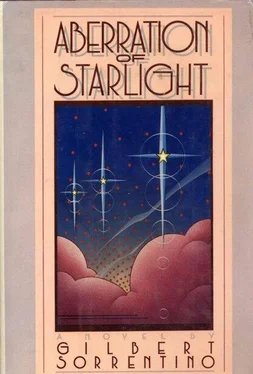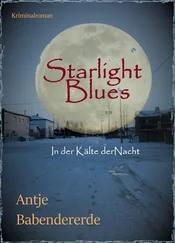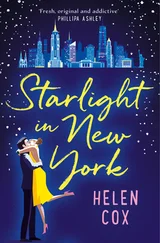Wouldn’t be surprised if that mockie fixed it up with some crooked judge to have it say he was born here. On the Fourth of July. Ziegfeld Follies when she went into labor. Worked as a scaler when he was twelve when it was an art. All done by hand hanging from a scaffold. Full of fun. Angelo sang “Ciel’ la lun’.” Goddamned greaseball, Uncle Mark said, and Uncle Michael, Kitty and Mary Caffrey agreed. Cups of warm blood. Tom foaming at the mouth telling a story. Joe had a moustache. Orange blossoms and they were fresh. Down in Miami Beach with the tramp with her green teeth. “Match her dress.” Not even a card for Christmas. Not a cent. Not a word. May God damn them both. Bought Billy a game in Woolworth’s where you shot little brown celluloid beans into the eyes and mouth of some grinning gawm. And then he got a scarf and a pair of mittens from her mother and father from Namm’s. And Christmas dinner, don’t forget Christmas dinner! One year a little tin pig that marched around the floor beating a tin drum until he fell over. And another scarf, even cheaper, another pair of mittens, cheaper, cheaper. His white Borsalino. Miami Beach. Not a card. Not a word. Down there with his floozy doing every filthy thing. Mr. and Mrs. Recco. It is all, believe me, Marie, “perfectly legal.” Couldn’t get fifteen dollars a week for the both of them. Katie’s. Charity case. Still has the burn scars from that damn iron. Those pleats, my God. Eight dollars a week at the steam table at Bickford’s. Left Billy every morning with a dime for lunch and told him not to talk to strangers or go with people who said his father wanted to see him. Evil eye. Margie with the kid gloves and she never saw them again. Crawled around on her hands and knees with ‘the pain. That old horse’s ass of a quack gave her sugar pills. A handsome little boy with dark eyes and curly hair. Long cape and boots. Katie’s Arthur decorating the tree with blue balls and icicles and blue lights. All day long, the little snob of a peacock. His fiancée, bucktoothed schoolteacher, her chest so big she could hardly stand up straight. Beautiful Buddy dead and Leonard sitting like a stick and little Janet running wild. “Wash the tub!” White satin and duchess lace, what became of it all. She wanted a daughter too. Thank God it didn’t happen. God is good. Things she didn’t know the words for. That bimbo invented half of them if the truth were known. Showed him how. And poor Minnie Recco left at the church two years later by some dumb Polack with clothes that would blind you and big enough to fit Finn MacCool. Fiorenza died, tall and dignified. He collapsed. Miami Beach. Orange blossoms and an extended trip. “When you leave New York you is just campin’ out.” Who was that barber with the long Russian cigarettes? Sweet on Katie but Leonard still alive if you can call it that. Driving a trolley for fifteen years for the Public Service, then the stroke nearly killed him. Bad teeth. Sat in a rocking chair all day long and Katie waited on him hand and foot. Poor girl could hardly read and write and no wonder. Washing and ironing and scrubbing and cleaning and shopping and cooking. “She should get down on her knees and thank God she’s got someone to give her a roof over her head and three meals a day.” Her father silent behind his newspaper. Given away. They never saw anybody like you. An American girl. Blond and blue-eyed. They’re black as niggers, look where they are, right next to Africa. Billy told her Mommy and Daddy broke the bed and she wouldn’t say a word to her for a month, filled with rage. With envy, if truth were told, God forgive her. Her father tried to help, pitiful. On the hottest nights he would give her a glass of beer when her mother went to the bathroom. Only if he had a “good pint.” She caught him once and he had no peace for a week. Gave her away. Irish point lace. In cap effect. She was a stunning bride, even the photographer said so and he’d seen hundreds. White roses and lily of the valley. Red Moon with wire-spoke wheels. Red silk slippers. When he took her in his arms in the dim light of the hotel room. Flowers in January. Let the big-shot dago success pay for a big-shot kike specialist. What actually happened?

Tom Thebus is singing in a monotone under his breath, singing in the sunlight that turns the croquet lawn on which he stands into a dazzle of green. “I’ll Never Smile Again.” His mind is not on the game that he is playing with Ralph and Grace Sapurty, but he interrupts the whispered and only partly recollected lyric of the song again and again to look over the lie of the balls and the possible shots that he considers for them as well as for himself: he does this with a casual professionalism, an insouciance carefully kind and tinged with camaraderie and humility, so that neither of his opponents becomes annoyed, ever, at his advice. On the contrary, they are flattered by his attentions.
He glints an occasional smile across the lawn at the woman who sits on a canvas chair in the shade of the umbrella trees at the very edge of the lawn, just this side of the large and beautifully tended kitchen garden. His smile is easy and warm, a smile that he thinks of as one of his good points. He is, indeed, vain about it, as he is vain about his small, scrupulously trimmed moustache and his wavy brown hair. She avoids his smile and his eyes, afraid, he knows, that he will discover in her eyes her admiration for and delight in him. She hides behind a copy of Liberty. But he knows that she admires him, and his actions, although performed as if he is not aware that she is considering each one of them with enormous care, are choreographed for her pleasure. He crouches now, his hair softly gleaming with rose oil, then stands straight, filling his briar from an old leather tobacco pouch. Mr. Sapurty is gesturing with his mallet toward two balls that lie close together on a slight incline beneath the heavy, powdery-blue flowers of a giant hydrangea. Tom Thebus, lighting his pipe, nods, and then gestures as well, using the stem of his pipe. It is a gesture that he has seen made in countless movies, and he imitates it flawlessly. Grace Sapurty shifts from one foot to another, smiling foolishly at him, her fingers touching the pink and yellow embroidered flowers on the bodice of her sundress.
Mr. Sapurty takes his shot. His ball hits the edge of the wicket planted at the base of the hydrangea and rolls down the incline. Tom Thebus smiles, not a smile of triumph, but one of good fellowship. “Brothers in difficult straits,” his smile says. “Tough luck,” it says.
Tough luck, he says. That’s a hard shot. He turns then and fires a glance straight at the woman in the shade and this time their eyes meet and she flushes, turns a page of her magazine, then another, looking down blindly at her lap. Tom walks toward his ball, his mallet on his shoulder, peering up with his eyes only toward a second-floor window that overlooks the lawn. He sees behind the dotted-Swiss curtain that hangs there the dark shape of the old man.
As he lines up his shot, his impeccably white shoes planted on either side of his mallet, he begins to whisper again. “I’ll never love again until I smile at you.” And then he sees, coming around the front of the house, the heavy-thighed body of Helga Schmidt. She is smiling a general greeting at all the figures on the lawn, her hand raised, but her eyes are twisted upward and to the left, focusing on the flat white of the dotted-Swiss curtain. Tom smiles as well, but not at Helga.
Dear Alex,
Читать дальше













